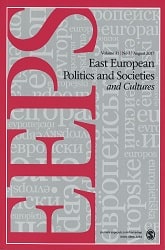Federalism and Nationalism in The Austro-Hungarian Monarchy: Aurel C. Popovici's Theory
Federalism and Nationalism in The Austro-Hungarian Monarchy: Aurel C. Popovici's Theory
Author(s): Victor NeumannSubject(s): Political Philosophy, Political history, Government/Political systems, Nationalism Studies, 19th Century, Pre-WW I & WW I (1900 -1919), Interwar Period (1920 - 1939)
Published by: SAGE Publications Ltd
Keywords: Federalism; nationalism; Austro-Hungarian Monarchy; Aurel C. Popovici; 19th century; 20th century; political evolution; political theory of federalism;
Summary/Abstract: Federalist and nationalist ideologies became important issues in the political debates of Central Europe beginning in the mid-nineteenth century. The conflict between these orientations was strong during the period of deconstruction of the Austro-Hungarian Empire and had important consequences for the political evolution of the small nation-states formed after the First World War. Contributing to the debate was the political theory of federalism articulated by the Romanian ideologue, Aurel C. Popovici. Though his doctrine of federalism is unknown to western historiography and political science, as author of The United States of Greater Austria and as a participant in the debates initiated by the informal cabinet of the Austro-Hungarian prince, Franz Ferdinand, Popovici attracted followers at the beginning of the twentieth century, long after the collapse of the Dual Empire. [...]
Journal: East European Politics and Societies
- Issue Year: 16/2002
- Issue No: 03
- Page Range: 864-897
- Page Count: 34
- Language: English
- Content File-PDF

